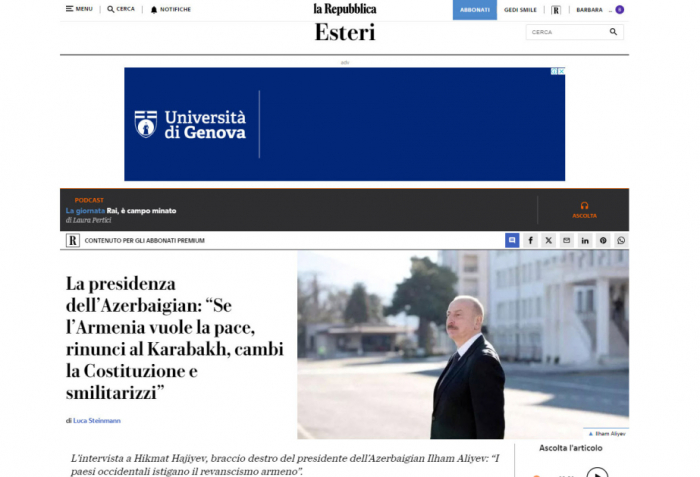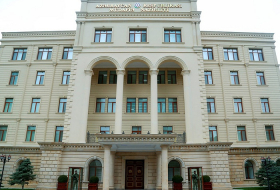Assistant to the President of the Republic of Azerbaijan and Head of the Department of Foreign Policy Affairs of the Presidential Administration, Hikmat Hajiyev, has given an extensive interview to “La Repubblica” newspaper, one of the leading Italian media outlets. In the interview, the Assistant to the President talked about the peace process between Armenia and Azerbaijan and noted that some Western countries were inciting revenge tendencies in Armenia. AzVision.az is presenting the interview citing Azertag.
- How close are we to peace between Armenia and Azerbaijan?
- There is actual peace in the region, which has been achieved not thanks to Armenia's goodwill, but due to Azerbaijan's military and coercive measures. Since no tangible results were achieved in resolving the conflict for 30 years, we had to conduct two military operations in 2020 and 2023, which resulted in the liberation of Karabakh lands occupied by Armenia and the restoration of our territorial integrity. We won the war and now want to establish peace.
We are closer to peace than ever before, but there are still obstacles in the way. The first is the Armenian constitution, which calls into question the territorial integrity of Azerbaijan. Its preamble refers to the declaration of independence, which contains the word “Miatsum” written in the Armenian language, or a “unification” of Azerbaijani territories of Karabakh with Armenia. We want to reach a peace agreement not only with the Armenian government, but also with the Armenian people, who should raise their voice and demand that a referendum be held to amend the constitution and renounce territorial claims to Azerbaijan. A peace agreement is not a piece of paper, it should serve as a guarantee that no-one in Armenia will resort to revenge against Azerbaijan, which poses a threat to peace in the region.
- Are you not worried about the possibility that the incumbent Armenian government you are negotiating with will adopt a policy contrary to the goals of the negotiations?
- There is a concern in Azerbaijan not only with Armenia’s political power, but also, in general, with the widespread tendency of revenge in their mainstream. The concept of creating a “great Armenia” by occupying the territories of neighboring countries under the guise of “historical Armenia” still occupies a major place in their mentality. It looks as if someone in Rome were to claim the restoration of the Roman Empire.
Therefore, there is a need for a referendum in which the Armenian people would renounce revenge, give up claims to Karabakh and protect the possible peace agreement from revisionism on the part of future Armenian governments.
- President of Azerbaijan Ilham Aliyev recently announced that Yerevan, the capital of Armenia, was an Azerbaijani city. Do you have territorial claims against Armenia?
- My ancestors come from Goycha region, which Armenians call Sevan. Most Azerbaijanis are originally from the territories that are now inhabited by Armenians, but from a historical point of view, they are rich in the cultural heritage of Azerbaijan. These also include territories that belonged to the Iravan Khanate, which was historically an Azerbaijani city but was later occupied by the Russian Empire. This is a historical and cultural issue associated with civilian people’s right of return. The Azerbaijanis originating from those territories should be allowed the opportunity to return to their ancestral lands. This, however, is neither a territorial claim nor a violation of Armenia's sovereignty.
- What are the other obstacles to achieving peace in your opinion?
- Armenia’s militarization should be responsible and proportionate. For example, Yerevan is buying long-range missiles and artillery systems from France, and these can be used to attack Azerbaijani cities again. The best solution for Armenia would be neutrality, not military alliances that jeopardize Azerbaijan's security.
The fact that certain Western countries with a colonial past are using Armenia to promote their policies and intrigues in the Caucasus, as they did in Africa, is producing the opposite effect. For example, France and its government do not have a complete understanding of the region and are making geopolitical mistakes that will work against Europe. Militarizing Armenia and thus triggering tendencies of revenge does not help peace.
We also see the European Union's military presence in the region in the form of its border monitoring mission in Armenia and the European Peace Facility, a military project intended for Armenia. If the EU becomes a military factor in our region, legitimate questions will arise: what is the goal behind the militarization of Armenia?
- Do you rule out Azerbaijan’s other military operations against Armenia in the future?
- Our strategy is about defense and deterrence. We have no territorial claims to other countries or military targets there. Our primary goal is the complete peaceful transformation of the South Caucasus. Like any other country, we have the right to self-defense. If Armenia places long-range missile or artillery systems on our borders, then we will have legitimate concerns.
- Another obstacle is related to defining the borders between Armenia and Azerbaijan. Yerevan accuses you of occupying a part of its territory...
- These accusations are baseless. The process of defining the border is currently underway. Until recently, eight villages were under Armenian occupation, four of them were liberated as a result of border determination. Armenia claims that in September 2022, Azerbaijan established military control over a part of uninhabited border territories. But if it hasn’t been defined yet and if no-one knows where the border line is, how can they accuse us of taking over their territory?
Then there is the main problem. In the last 30 years, Armenia never established a border with Azerbaijan and has not fulfilled its obligations under the 1991 Alma-Ata Declaration. Instead, it invaded our territories and built fortifications there. Rather than accusing us of having occupied their territory, it would be appropriate to discuss this within the framework of the border delimitation process.
- One year ago, one hundred thousand Armenians left Karabakh. Will these people have a chance to return to their homes?
- In the last 30 years, Armenia carried out a policy of ethnic cleansing against Azerbaijanis in Karabakh, drove out people, destroyed our mosques and razed our sites to the ground. Last year, when we conducted a military operation to restore our territorial integrity, we did not bomb civilians, we told them that they could stay if they wanted, and we also created corridors for them to go to Armenia. The condition was that they have to accept Azerbaijani citizenship and rules and stop living in the “gray zone” as they did before. But they did not accept that and almost all of them decided to leave.
The vast majority of Karabakh Armenians, especially men, were involved in military activities and participated in operations and battles against Azerbaijan. If they want to come back, they will have to adopt our citizenship and accept our laws. However, Armenia, too, should be ready to grant the same rights to the Western Azerbaijani community and enable them to return to their homes.
- Some high-ranking politicians have described Armenians as pigs on Azerbaijani television and in the media. Do you think reconciliation will ever be possible?
- Ethnic reconciliation is one of the most difficult aspects of any conflict, it will not be an easy or short process. We see that this is fairly widespread among Armenians, but this issue is not the main topic of discussion, it is not on the agenda, and it cannot and should not be attributed to the government that is fighting it.
Azerbaijanis were subjected to occupation, ethnic cleansing and destruction of their property. It is not easy for Azerbaijani IDPs returning to their homeland after 30 years to see that their houses and cemeteries have been destroyed and the whole area has been mined. It is not easy either to accept that 4,000 Azerbaijanis are missing and there is no information about them. But we must look to the future to build more confidence and heal the many wounds that are still bleeding.
More about:















































